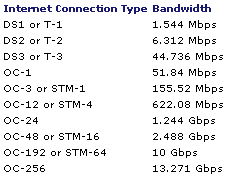To evaluate a web host, the price is not the only
important factor, the client will need to take consideration about other
characteristics.
To evaluate a web host, the price is not the only important
factor, the client will need to take consideration about other
characteristics.
Host's Connection to the Internet
One
of the most important features is the quality of host's connection to
the Internet. There are a bunch of variations T-1, T-3, OC-3, OC-256,
etc. (Fig 5) A company that offers a T1 connection to the Internet can
only allow 1.544 Mbps (Megabits per second) a T3 can allow up to 45
Mbps. Then again an OC-256 can allow 13,000 Mbps, giving the ability to
transfer much more information at a higher rate of speed before getting
bogged down.

Speed
Customers that are seriously worried about speeds
that a viewer can see their site, need to consider how fast the servers
are. Although bandwidth and connections are major factors, server speeds
are equally important. A server that is a host to many sites that are
being accessed simultaneously may get bogged down. No matter how fast
the connection is this can seriously slow down a viewer’s speed to
surf through a site. A simple way to test the speed at which a server
responds is called "pinging" a site. This will determine how quickly a
server can receive and send back a small piece of data through the
connection you have to it.
Processor speed is also important.
Certain sites will make greater demands on the host's CPU and will
consequently run slower - and slow down every other site on the server
as well (Beginner's Guide, 2000). Streaming video and audio, discussion
forums and message boards, online surveys, and high-level animation all
require huge amounts of memory and fast access to the main server.
Overloaded processors can slow down a site's transmission considerably.
Server Software
Server
software can also affect a site. UNIX and Windows NT are the most
common server software environments. Advanced developers should be aware
of what applications they will be using and assess which software
environment will best suit their needs. Some hosting companies only
offer one of the two software options.
Security
Protecting
a site's data from unwanted intrusions is another key consideration for
the web developer when selecting a host. The hosting company's security
protocols should be outlined. Protection from everyday denial of
service attacks and the various hacks and cracks that will be attempted
on your server is essential. The hosting company should be responsible
for upgrading and maintaining these security measures. "The only thing
worse than having no security is thinking you have some" (Finding the
Host, 2001).
Customer Service
Service is another
important aspect to consider when shopping for a host. Hosts offer a
variety of customer service options. Services offered can be 24-hour
toll free number, 24-hour email help, Frequently Asked Questions pages
and help forums. The amount of help you might need depends mainly on
your experience and problems you encounter from the server.
Reliability
Checking
out the reliability of a service is also very important. Hosts usually
have several backup systems in case something goes wrong with the main
servers. They also can promise less "down time" by backup power systems
such as a diesel generator.
